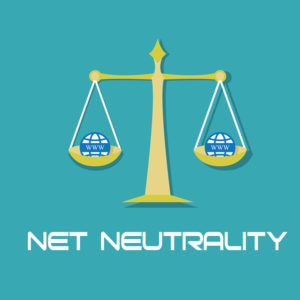Even before impeachment gained momentum, Americans overwhelmingly agreed that our country is “on the wrong track” and disapproved of the performance of the president and Congress.
That’s largely because, even on issues where there is broad public agreement, the legislative and executive branches have been unable to find sensible solutions.
Exhibit A is an issue that should be about technology, not ideology: broadband policy. Over two decades, most Americans have come to agree about the basic principle of “net neutrality.” That’s the common sense idea that all internet traffic must be treated equally, and no company should be able to block or throttle online traffic in order to gain a competitive leg up.
But still, some progressives insist on all-or-nothing over-regulation of the internet, while some conservatives contend that the best thing the federal government can do is nothing at all. Thus, in a textbook case of the partisans shouting down the pragmatists, Congress has been unable to craft consensus legislation that would make net neutrality the law of the land and a source of certainty for consumers, startups and internet providers.
Last year, in a party-line vote, the Democratic majority in the House of Representatives passed a bill combining net neutrality protections with a controversial reclassification of broadband as a “Title II” public utility. For the uninitiated, Title II was created to regulate telephone monopolies during the 1930s; applying such an outdated framework to the modern internet used to be a non-starter with majorities in both parties, and remains so among Republicans.
This has led Senate leaders to declare the House bill dead on arrival. While bipartisan conversations are still trying to identify a path forward, these talks risk getting drowned out in the partisan swirl of impeachment unless more leaders step up and recognize the need for a pragmatic solution.
Meanwhile, in a decision handed down in October, the U.S. Court of Appeals for the D.C. Circuit rejected arguments to reinstate Obama-era net neutrality protections that had been repealed in 2017 by the Trump-appointed FCC. Activists who urged Democrats in Congress to avoid bipartisan negotiations in hopes that the courts would simply restore the previous rules have had that rug pulled out from under them.
If resolving this impasse seems impossible, it shouldn’t be, unless mainstream Americans have given up on seeking consensus on our common concerns.
In fact, the contours of a consensus solution are staring us in the face. We just need to figure out a framework that can get the bipartisan support to pass a Democratic House and a Republican Senate. This framework is far from secret:
Let’s set simple, enforceable rules to protect an open internet. Let’s prevent both broadband providers and dominant tech platforms from blocking, slowing down or unfairly favoring some sites, services and apps over others. And, while we’re breaking the gridlock, we can also break new ground by setting new requirements for openness and transparency on how internet platforms mine and use our data.
Americans want a common sense solution to the net neutrality impasse, not dead-end ideological purity that confuses progress for surrender. If we crave a philosophical framework, we can find one in the historic, bipartisan Telecommunications Act of 1996.
Looking forward to an emerging technology, this landmark legislation said simply that the federal government must protect consumers with all the regulation they need — but no more.
If we want policy consensus, not perpetual conflict, the difference between classifying broadband internet as “information services” under Title I or “telecommunications services” under Title II must not be the hill for internet reform to die on.
As with the old TV spot where beer-drinkers debate whether their beverage “tastes great” or is “less filling,” broadband policy can protect consumers while still encouraging innovation and investment. This doesn’t need to be “either or”; it can and should be “both and.”
Once we enact a sensible solution, consumers will be protected while internet providers and entrepreneurs will enjoy the certainty that encourages new investment and innovation. The nation will be better able to tackle more pressing broadband challenges: connecting new communities, reducing the digital divide and developing telemedicine and other advances.
The time is right for a compromise that protects the open internet and finally calls a halt to the dead-end cycle of endless net neutrality battles. Let’s all be willing to take “yes” for an answer.

